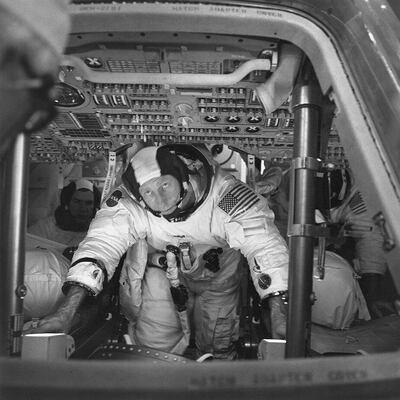The death of Nasa astronaut Al Worden on Wednesday closes another chapter in the history of man’s exploration in space.
As the pilot of the command module on Apollo 15, he orbited the Moon 75 times during July and August 1971 while fellow crew members David Scott and James Irwin explored the lunar surface below.
It was during one of these orbits that Worden earned his place in space history as he retrieved scientific recording instruments, including cameras, mounted to the outside of his spacecraft.
At 200,000 miles high, it remains the farthest from Earth that any human has walked. Had he failed return to the capsule, it would have doomed all three.
The distance of 3,596 kilometres from his colleagues on the surface is also believed to be the furthest distance ever recorded between two humans without any other human being between.
Worden’s mission, which saw the first use of the Lunar Roving Vehicle, was the fourth landing on the Moon.
It was also marked by controversy, after it was revealed the crew had smuggled commemorative stamped envelopes onto their ship, later selling some of them to a German stamp dealer.

As a result, Nasa prevented any of the astronauts from going into space again.
The punishment did not deter Worden’s enthusiasm for space flight. Three years ago he visited the UAE, speaking to young people, including Alia Al Mansoori, the winner of the Genes in Space competition.
During his visit, he also spoke to The National about Apollo 15. "There was part of the flight where I had no light on me from the Earth or Sun," he said. "Complete darkness except for starlight.
"The stars were a wash of light - no one individual star as you couldn’t see one. Just a wash of light because there were so many. It makes you think about the universe we live in.
“You begin to realise we are not alone in the universe. There are going to be all kinds of people out there. There are going to be a finite number of planets that have intelligent life.”
Worden also praised the UAE’s embrace of space exploration, and the Hope mission to Mars. “Anything in the future needs to be co-operative and I see the seeds of that here," he said. It’s a great place.”
Worden, who died in an assisted living home in Texas aged 88, was born in February 1932 in Michigan.
As a pilot in the United States Air Force, he rose to the rank of colonel and was one of 19 astronauts selected by Nasa for its Apollo programme in 1966.
After leaving Nasa there was a failed attempt to run for the US Congress in 1982. He was married twice, with three daughters by his second wife.
In a message on his personal website, the family described him as “a much admired man of great personality and energy, and an engaging storyteller who touched the souls of many”.
“We have lost another voice from that great Apollo generation. Our heartfelt condolences go to his family, friends and colleagues.”
In a statement, Nasa administrator Jim Brindenstine called Worden “an astronaut whose achievements in space and on Earth will not be forgotten".
Of the 24 men who flew to the Moon between 1968 and 1972, only 11 are still alive.


